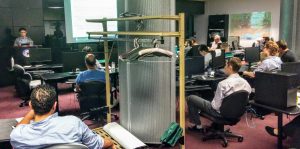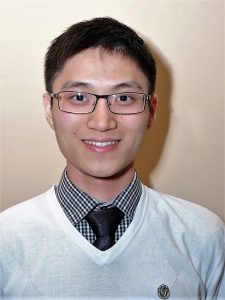September 5, 2017

The UT-ITE Seminar Series (usually held on Fridays) opened today with Bo Wen at 1 p.m. Bo presented his MASc thesis, “Data-Driven Mesoscopic Simulation of Large-Scale Surface Transit Networks” to an audience of fellow students, professors, research associates and visitors in the ITS Lab, SF3103.
The UT-ITE Seminar Series continues this week with Yishu Roy Pu, September 8 at 11:00 a.m. All are welcome to attend.
Following his successful talk, Bo Wen kindly agreed to share a PDF of his presentation file here.
Abstract
The planning of transit services, assessment of operational strategies, and evaluation of service changes can benefit tremendously from high-fidelity transit network models.
Traditional microsimulation models are infeasible for large networks due to onerous model construction and calibration and prohibitive computational requirements. They are typically only used to model individual corridors or small sub-networks.
This study presents a data-driven mesoscopic simulation method that models surface transit movements based on open data and machine learning. After a comprehensive comparison of running speed models using multiple linear regression, support vector machine, linear mixed effect model, regression tree and random forest, the random forest running speed models and lognormal dwell time distribution models were used to perform the stop-to-stop mesoscopic simulations. The model results adequately replicated the variations in headways, delays, and dwell times.

Bo Wen is an MASc student under the supervision of Professor Amer Shalaby in the Department of Civil Engineering at the University of Toronto. His research focuses on the use of open data for large-scale public transit modelling and simulation.
Bo received his BASc in Civil Engineering from the University of Toronto in 2015. In his spare time, he enjoys reading, cooking, exercise, and participating in open source projects.
Acknowledgements
This work would not have been possible without the support of industry partner ARUP, the Natural Sciences and Engineering Research Council of Canada (NSERC), and the University of Toronto.
Bo Wen would like to personally extend his gratitude to members of the Nexus project group, Professor Amer Shalaby, Erin Morrow, Dr. Siva Srikukenthiran, Yishu Pu, Greg Hoy, and Teddy Lin.
This seminar was presented by the University of Toronto Institute of Transportation Engineers (ITE) Student Chapter.
